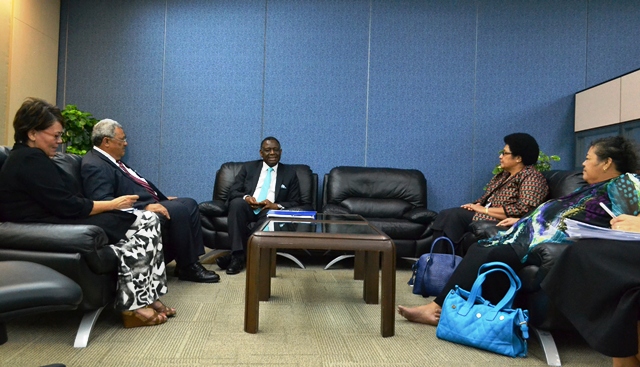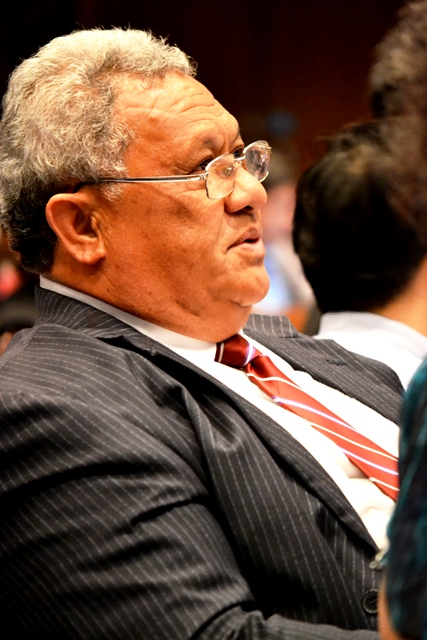September 17, 2013 (Bangkok, Thailand) - The Pacific delegation to the 6th Asian and Pacific Population Conference (APPC) will speak with a strong collective voice for its regional priorities.
The region stamped its presence yesterday with a strong statement of its intentions to contribute substantively to the reshaping of the global development agenda beyond 2014, when the existing 20-year Programme of Action (PoA)of the International Conference on Population and Development (ICPD) comes to an end.
With a delegation of civil society and state representatives, including ministers and a head of state, the statement was a reaffirmation of the Moana Declaration; the declaration which summarized the deliberations on progress with key actions to follow up on the ICPD PoA borne out of a Pacific conference of parliamentarians in Suva (Fiji) in August this year (2013).
Speaking for Pacific delegates, Cook Islands Minister for Health Honourable Nandi Glassie said Pacific Countries were committed a further strengthening of a rights-based approach in advancing the ICPD agenda.

"We would like to contribute to reshaping the ICPD beyond 2014 and post 2015 development agenda at the regional and global levels and we will speak with a strong collective voice around these priority issues for the Pacific," Hon. Glassie said.
"Given that teenage pregnancy is an issue in many of our countries, we intend to prioritise adolescent and sexual reproductive health and rights, including through comprehensive sexuality education, and establish accessible SRH and mental health services for youth in schools and other educational institutions, youth organisations, faith based organisations and communities, ensuring their meaningful participation.
"We endorse the prioritization of couples' and individuals' access to contraception and information to make free and informed decisions about the number and timing of children, thereby preventing unwanted and unplanned pregnancies and reducing the need for abortion."
Making reference to recent studies on gender-based violence in the Pacific, which revealed high levels of violence in all forms against women and girls, Hon. Glassie recommended on behalf of Pacific leaders an integrated response to gender-based violence in all sexual and reproductive health programmes and services.
The Pacific delegation reiterated the key elements of the Moana Declarations which Hon. Glassie said pertained to ensuring sexual and reproductive health and rights for all our people, without discrimination on the basis of age, sex, gender identity or sexual orientation, economic status, religion and or ethnicity.
The APPC is a once-in-decade gathering which shapes the regional population agenda; this year however it coincides with the review process of the ICPD PoA, a development agenda accented to by 179 countries in Cairo, in 1994. A Ministerial Declaration at the end of the week will serve as the Asia-Pacific input to the United Nations General Assembly special session on the ICPD beyond-2014. The review aims to put the sexual and reproductive health and rights of women, girls and marginalized groups at the heart of future development goals.
UNFPA Executive Director Dr Babatunde Osotimehin reminded delegates when delivering his address during the formal opening of the conference, that with half the world's population comprising young people "the future is quite literally in your hands".
"Nineteen years ago in Cairo the global community laid out a ground-breaking vision for the well-being and dignity of all people. That vision provided the basis for the right of individuals to make choices to live in dignity and enjoy well-being, and for the world to achieve sustainable development. This week you have the power to decide on the steps necessary to make this vision a reality for current and future generations," Dr Babatunde said.
"This conference is our opportunity to determine how best to respond to existing and emerging challenges, and also your opportunity to provide ground-breaking leadership.
"It is clear that this region will continue to be at the forefront of the population challenges and opportunities of the 21st century. Asia - already the most populous region in the world - is projected to add a billion people over the next 40 years. Therefore, the course you set for responding to population dynamics and the challenges and opportunities of our modern populations will have a global impact.
"And while the challenges are many and complex, we can draw from and build on the rich experiences and resources in the region - the dynamism of your economies, opportunities for South-South and triangular cooperation, and the findings and conclusions of the global ICPD beyond 2014 review.
"Strengthening partnerships at every level, especially with civil society and the private sector, and empowering individuals enhances the effectiveness that we can bring to changing and shaping our world."


